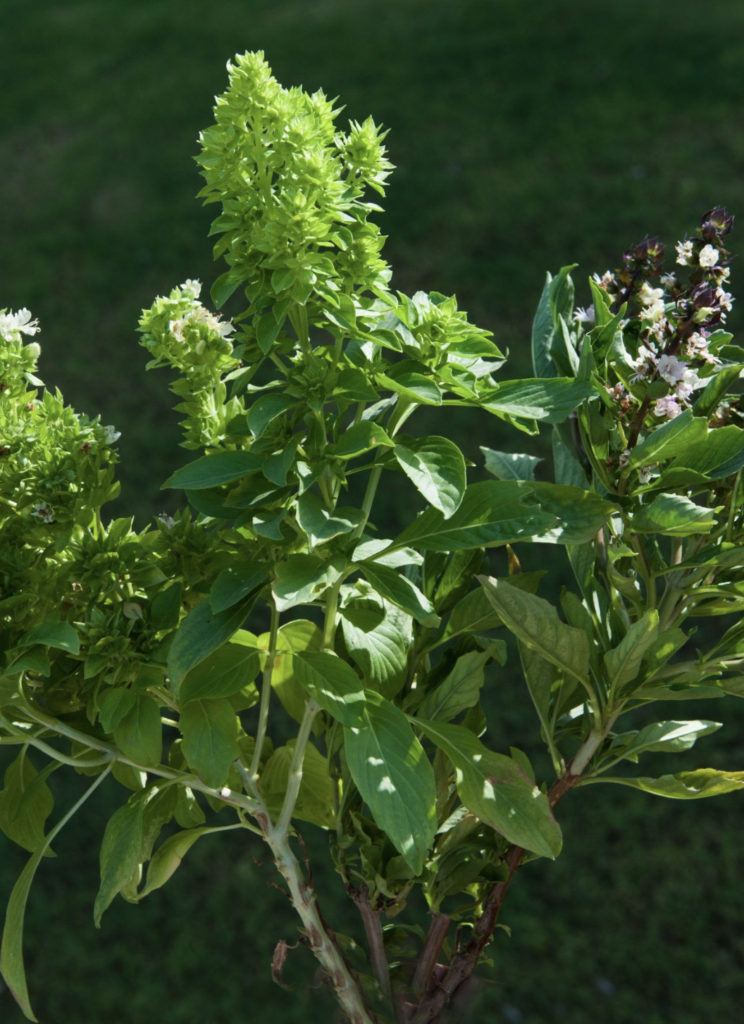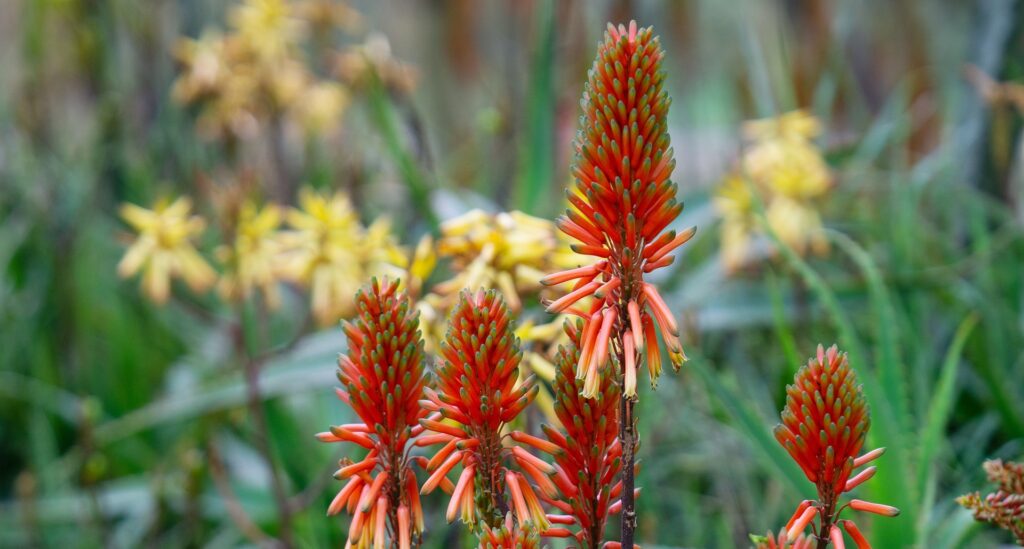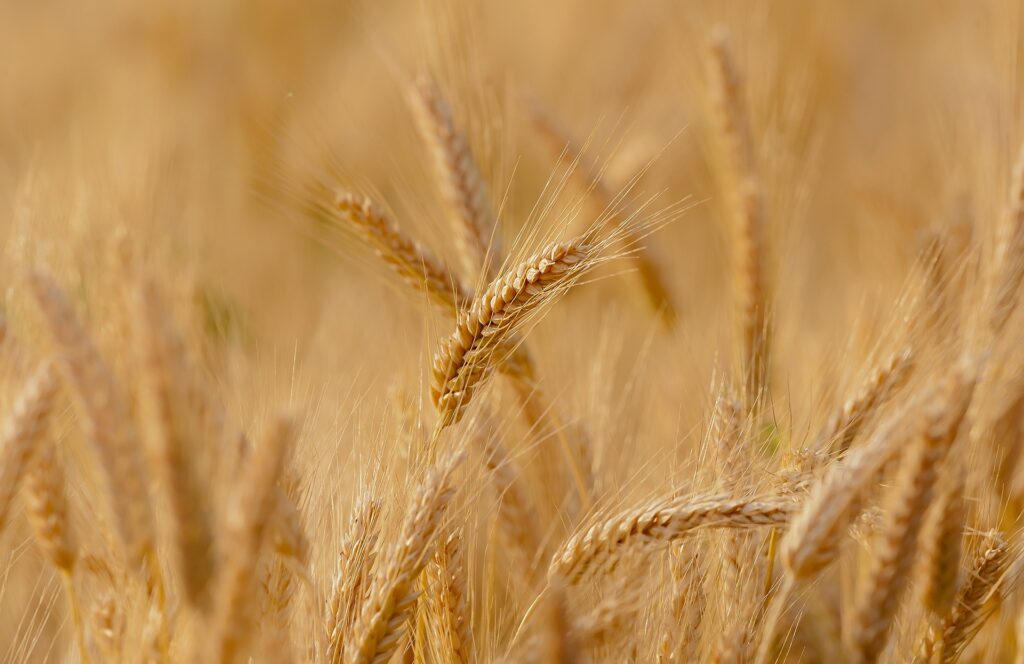
—————————————
Significance:
Bananas are indirectly mentioned in the Quran, notably through the word ‘Tahl’, which refers to a thorny tree or Acacia. The phrase “Talh Mandoud” may be interpreted as ‘closely arranged fruits from bottom to top’, just as in a banana tree.
The verse this is derived from is:
“And those on the Right—what of those on the Right? (27) In lush orchards. (28) And sweet-smelling plants. (29) And extended shade. (30)”
[Al Waqi’ah: 27-30]
—————————————Bananas are displayed in the Water Garden.
Note: Image is courtesy of Pixabay. Information courtesy of the QBG.

—————————————
Significance:
Basil is mentioned twice in the Quran, notably for its sweet fragrance, described by God as the aroma of paradise:
“So, if the deceased is one of those brought near ˹to Us˺, (88) then ˹such a person will have˺ serenity, fragrance [basil], and a Garden of Bliss. (89)”
[Al Waqi’ah: 88-89]
—————————————
Basils are displayed in the Sound Garden.
Note: Image is courtesy of Pixabay. Information courtesy of the QBG.
Introduction
Humans do not always have the fairest interaction with the natural world. The complexity of ecological inquiry compels us to probe this unequal partnership. A question arises; should we give all living and non-living creatures the same value regardless of their utility to people, or should we prioritise the needs of human beings above all others? Using a deep ecologist perspective and the QBG as evidence, I argue that the former is correct.
Deep Ecology: Two Perspectives
When it comes to how people interact with the natural world, “deep ecology” advocates for a paradigm shift; people are just as crucial to deep ecologists as any other component of nature (Botar and Wünsche 15). Critics of deep ecology say it is unfair to focus on protecting the wild when so much of the developing world needs development (Guha 75). Guha (75), for instance, contends that the natural riches of the agrarian society are being lost to the wealthy due to deep ecology’s efforts to protect the wild. However, such attitudes would be unfortunate to undermine the many conservation groups working together, especially in light of climate change. To appreciate nature, one must look beyond its potential benefits to humanity. Humans are responsible for aiding in nature’s preservation, not the other way around. The QBG accomplishes this through its initiative to identify and catalogue the many plants and botanical words referenced in the Holy Quran and Hadith. Plants referenced in the Quran and Hadith have been compiled into a single volume as part of the Garden’s mission to protect nature.

—————————————
Significance:
It was reported by Nubaih b. Waab:
“We went with Aban b. Uthman (in a state of lhram). When we were at Malal the eyes of Umar b. Ubaidullah became sore and, when we reached Rauba’ the pain grew intense. He (Nubaib b. Wahb) sent (one) to Aban b. Uthman to ask him (what to do). He sent him (the message) to apply aloes to them, for ‘Uthman (Allah be pleased with him) reported that the Messenger of Allah (PBUH) applied aloes to the person whose eyes were sore and he was in the state of Ihram.”
[Sahih Muslim 1204a]
—————————————
Aloes are displayed in the Sound Garden.
Note: Image is courtesy of Pixabay. Information courtesy of the QBG. Translation of Hadith provided by Sunnah.com

—————————————
Significance:
It was reported by Ibn `Umar:
“Allah’s Messenger (PBUH) enjoined the payment of one Sa’ of dates or one Sa’ of barley as Zakat-ul-Fitr on every Muslim slave or free, male or female, young or old, and he ordered that it be paid before the people went out to offer the `Id prayer. (One Sa’ = 3 Kilograms approx.)”
[Sahih al-Bukhari 1503]
—————————————Barley are displayed in the Sound Garden.
Note: Image is courtesy of Pixabay. Information is couretsy of the QBG. Translation of Hadith provided by Sunnah.com
Additionally, there is strong opposition to deforestation among deep ecologists because it is typically done for economic benefit. Deep ecologists believe society should be structured to prevent corporations from destroying entire ecosystems for profit (Talukder 9). Using philosophical and ecological lenses, Naess explores how anthropocentric attitudes, such as our drive for consumerism and materialism, negatively impact the environment. With the expansion of subsistence farming in the forests of the Third World providing neither aid to the poor nor protection from the forests’ destruction, he asks, “Is consumerism progress?” (Naess 253). Deep ecology rejects the anthropocentric view, which holds that humans are at the centre of all that is meaningful and that other flora and fauna only have value while they are valuable to us (Nations 79). “Subsistence farming” adds to consumerism since no foods or things would need to be imported from abroad in a living economy built on deep ecology. As a result of not being able to grow all of their food, subsistence farmers must import some items, which is neither a sustainable method nor one that fosters a close relationship with the land.
Therefore, Naess defends nature for its own sake. The biocentric perspective, which suggests this idea, argues that the non-human world is just as essential to humans as the human world is (Botar and Wünsche 15). We cannot accept our place in this vital connection if we shut ourselves off from it. Thus, to encourage a spiritual bond between humans and the natural world, deep ecology draws on Eastern religious traditions that offer explanations for this bond (Naess 254). There are two primary ways in which the QBG supports biocentrism. First, the Garden performs a crucial role in protecting the environment by preventing harm to the many species of plants collected from all corners of the globe. Secondly, the Garden’s educational programmes run all year long, promoting a sense of civic responsibility and reverence for the environment, highlighting the need for tree planting, and helping to preserve Qatar’s flora and fauna.
Works Cited
- Arne Naess, “The Third World, Wilderness, and Deep Ecology” (1995)
- Botar Oliver A. I and Wünsche Isabel. “Biocentrism and modernism.” Ashgate, 2011.
- Nations, James D. “Deep ecology meets the developing world.” National Academy Press, 1988.
- “Our Plants.” QBG, qbg.org.qa/plants.
- Ramachandra Guha, “Radical American Environmentalism and Wilderness Preservation: A Critique” (1989)
- Talukder Munir Hossain. “Nature and life: Essays on deep ecology and applied ethics.” Cambridge Scholars Publishing, 2018.